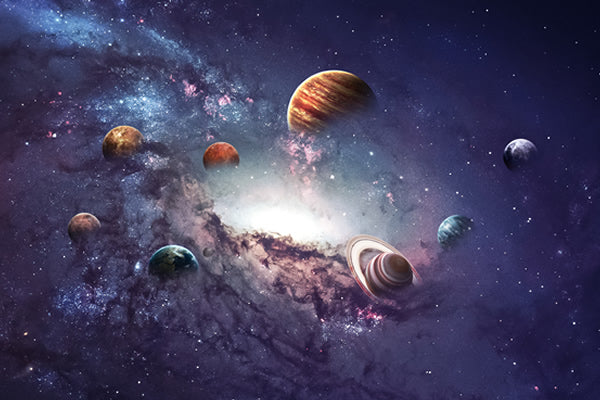What Does A Planet Mean?
Here’s how I am tempted to answer that seemingly legitimate question: very, very little. Alone, a planet is really just an abstraction.
Mercury, for one quick example, is related to our curiosity – and some degree of curiosity exists in more or less everyone. But obviously there are people who are driven by curiosity, and people who barely feel it at all.
More to the point, what exactly are you curious about? Show me an article about human migration patterns as reflected in ancestral genetics or 19th century sailing vessels, and I will devour it. Seeing those same articles, you might skip to a piece about how to improve your golf swing – while I would have to be paid handsomely even to read the first paragraph.
Curiosity is clearly not a question of right or wrong. It’s more like different strokes for different folks. We all have Mercury in our charts, and we can make a few general statements about its archetypal nature. But what does Mercury actually mean for an individual? Who knows? . . . or rather, who knows – unless we give that Mercury a set of distinct motivations and interests by placing it in a specific sign. After that, we might give it an area of characteristic behavior by putting it in a house. Then we could further wire it into the larger framework of the birthchart by studying the aspects that it makes.
A planet in a specific sign and a specific house: for actual human beings, that is the ultimate indivisible quantum unit of astrological meaning. A planet alone is only a broad idea, about as “human” as a lecture on taxation algorithms.
Even once we have a planet planted in such an elemental triad, there is still much that we cannot know about it. That is because the consciousness of the individual interacts decisively with the wide field of archetypal possibilities represented by that planet-sign-house combination.
That last idea is the drum I have been beating all through my astrological career, which boils down in many ways to a battle against the astrological determinists. I love astrology, but I really like to keep it in its place – and its place in the food chain of power is always a little bit below consciousness itself. My blood pressure goes up when I read some astrologer condemning a configuration as “inherently criminal” or even as automatically lucky. It is never that rigid. Some idiot on the Internet the other day dismissed my personal tendency toward liberal politics as evidence of my Sun-Neptune square. Give me a break. Sarah Palin has a Sun-Neptune square. So did George W. Bush.
Astrology is powerful and it always leaves its mark, but it does not run our lives. We run our own lives in a kind of creative partnership with the planets.
I finally got my box of copies of The Book of Air. The shipment had been delayed by the pandemic. Thumbing randomly through the pages, I came upon the opening of chapter seven. I realized it pretty well summarized everything I believe about astrology, and it did that in about a thousand words, using three concrete examples. As you read, let me spotlight the two main take-away points:
First, that the planet Uranus – and really any planet – has very little meaning in and of itself. It really needs to be placed in an astrological context before it lights up in any truly human way.
Secondly, as you will see, the wild card of consciousness itself interacts decisively with the planet-sign-house triad. You can build a house with a hammer, or you can bash your thumb with it. Planets work the same way.
Here are the first few paragraphs of chapter seven of The Book of Air, “Synthesis I: Putting an Air Planet in a Sign.”
We might offer an authoritative, helpful talk at an astrological conference about the significance of the planet Uranus. But the actual meaning of that planet for individuals is potentially so variable that claiming we know anything at all about it puts us on shaky ground. The supernaturally brilliant actor, Meryl Streep, for one example, is about as “Uranian” as a person can possibly be – she has the planet only one minute of arc from a perfect conjunction with her natal Sun. But both bodies lie in Cancer, aligned with her twelfth house cusp, underscoring a far more subtle, internalized expression of that normally rather zany planet.

Who is Meryl Streep as a person? I have no idea – and if I were to have dinner with her, I would be “surprised if I weren’t surprised.” With that twelfth house Sun, ego in the conventional sense simply never fully formed in her. At the risk of a slight over-statement, Meryl Streep can be anybody she wants to be. One sees that quality expressed so clearly in her astonishingly fluid acting. Again, ego simply does not automatically define her behavior the same way it does in most of us. That’s her twelfth house energy in action.
Add Uranus to the twelfth house, and you have a formula that marries two words: actor and genius.
Add the more retiring energies of Cancer to the mix, and another thing we learn is that she is probably not all that eager to meet me for dinner.
After all, I am a total stranger.
Another widely recognized genius – Walt Disney – had a Sun-Uranus conjunction too, but his conjunction fell in groundbreaking, colorful Sagittarius and in the media-oriented third house. Not to rob Walt Disney of his human complexity, but I think it is fair to say that meeting him would be far less of a “discovery mission” than meeting Meryl Streep. Those Sagittarian and third house energies are more straightforward and upfront. Walt Disney would be more like a friendly dog than Meryl’s cautious Cancer cat.

This all brings us back to our initial question: what exactly does Uranus mean?
Walt and Meryl, taken together, should help us answer that question. After all, they are both highly Uranian. But they are utterly different human beings. If Uranus is supposed to correlate with certain specific personality traits, we are standing on shaky ground.
Both of them are widely recognized as geniuses – perhaps that’s the jackpot. And genius and Uranus are indeed paired in astrological theory.
But here’s another Sun-Uranus conjunction for you: Peter Sutcliffe, the infamous Yorkshire Ripper, who murdered at least thirteen women. A genius? There is no way to make that case without bending over backwards. He was a pathological criminal, clearly – and “criminal” is another classic Uranian word. With a bow toward modern psychological perspectives, we might add that he was alienated and very probably suffering from some kind of dissociative disorder – and that too is Uranian language.

Sutcliffe’s Sun-Uranus conjunction was in Gemini and in his seventh house. Forgetting his actual story and just reading the symbolism from an evolutionary perspective, we can say that his soul was seeking a diversity of experiences (Gemini) in the relationship category (seventh house) and that these experiences had to unfold outside the context of consensual, conventional, socially-approved reality (Uranus).
Sometimes I get chills writing this stuff.
My point in comparing the very Uranian charts of Meryl Syreep, Walt Disney, and the Yorkshire Ripper is that claiming that we know very much at all about Uranus seems to verge on pure hubris. Its meaning is demonstrably quite fluid.
This is one of the reasons, by the way, that a scientifically-convincing “proof of astrology” has been elusive: our variables are simply “too variable.” Pinning anything down in a satisfyingly “this means that” kind of way has proven nearly impossible.
Here is the heart of the matter – or really, the twin hearts of the matter.
- The actual meaning of any planet is enormously impacted by the sign and house it occupies, as well as by the larger astrological context in which it finds itself.
- An individual’s level of response to a planet – the reality of human freedom, in a nutshell – is also pivotal. And it is unpredictable via any internal astrological measurement. You cannot see how a person will use his or her freedom anywhere in the chart itself.
Put Uranus on the Sun in Cancer and the twelfth house, and you get Meryl Streep – or perhaps you might get a maudlin whiner with a string of arrests for Driving Under the Influence.
There but for grace goes Meryl . . .
Put Uranus on the Sun in Sagittarius in the third house, and you get Walt Disney – or a contrarian blowhard with a windy, self-righteous argument belittling anything you happen to say.
There but for grace goes Walt . . .
Put Uranus on the Sun in Gemini and the seventh house, and you get the Yorkshire Ripper – or a fascinating, funny lover, who is an excellent listener and who has boldly made a faithful commitment to someone “born on the wrong side of the tracks.”
Uranus, in other words, is only an abstraction. It is these triads of planet, sign, and house, flavored by an array of aspects, that are actually the fundamental quantum units of astrological reality. That is how we experience the human face of the planets.
It is those triads that we must learn to understand if we are to give – or receive – helpful astrological counsel.
And even with exactly the same planet at the center, these triads differ from each other profoundly.
Facebook Comments

